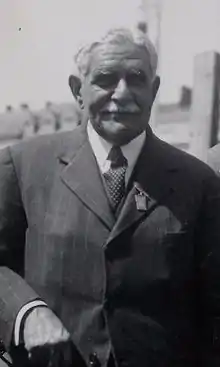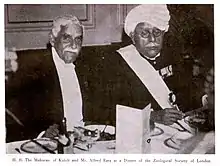Alfred Ezra | |
|---|---|
 Alfred Ezra in 1938, photographed by Alexander Wetmore | |
| Born | 1872 Calcutta, India |
| Died | 1 August, 1955 (aged 82–83) Surrey, England |
| Known for | Rare birds collection |
| Spouse | Muriel Sassoon |
| Children | 2 |
| Awards | Gold medal, Zoological Society of London |
| Scientific career | |
| Fields | Aviculture |
Alfred "Chips" Ezra, OBE (1872 – 1 August 1955) was a British breeder and keeper of birds. He built up a collection of rare birds at Foxwarren Park in southern England that was considered the finest of its kind.
Biography

Alfred Ezra was born in India in 1872 to a Jewish family and was privately educated in Calcutta. His father was Elias David Ezra and his mother was Mozelle Sassoon. His brother David Elias Ezra maintained a private zoo in Calcutta.[1]
He moved to England in 1912. During World War I he served with Indian troops in Europe, and was named an Officer of the Order of the British Empire for his efforts.[1]
Ezra acquired Foxwarren Park in Surrey in 1919. There he assembled a private collection of rare birds which was considered the finest of its kind before the World War II, when the estate was commandeered for war work. He was President of the Avicultural Society and a prominent member of the Zoological Society of London, which awarded him a gold medal. He also wrote articles for Avicultural Magazine and other journals.[1]
Collection
Ezra started collecting birds while a child in India. On his journey to England, he travelled through the Pamir Mountains and Turkestan, collecting rare birds and animals on this expedition.[1] From 1920 to 1940, his collection at Foxwarren Park was probably the finest private zoo in the world.[2]
He kept hummingbirds and sunbirds. Their specialised diet of nectar was difficult to reproduce in captivity, and Ezra established the importance of including fat, minerals, protein, and vitamins in their diet.[3] A mixture which he used with success added condensed milk and Mellin's Food—typically food for human babies—to honey, which was then watered down.[4] In this way, he was able to keep a garnet-throated hummingbird for eight years—a remarkable record when these had once been thought impossible to keep in captivity.[5]
Ezra also kept parakeets. In 1933, a pair of fledgling Indian ring-necked parakeets were smothered in their nest by a swarm of bees.[6] He had a pair of pink-headed ducks which were the last of their kind, now being thought extinct.[7]
Personal life
Ezra married Muriel Sassoon, with whom he had two daughters, Aline and Ruth. He died at Foxwarren Park on 1 August 1955, age 82, after a lengthy illness.[1]
References
- 1 2 3 4 5 J. Delacourt (1956), "Alfred Ezra", Ibis, 98 (1): 135–136, doi:10.1111/j.1474-919X.1956.tb03033.x
- ↑ Forest and Outdoors, 35: 117, 1939,
Mr. Ezra's hobby is his private zoo. It is probably the finest one in the world.
{{citation}}: Missing or empty|title=(help) - ↑ Paul A. Johnsgard (2016), The Hummingbirds of North America, p. 13, ISBN 978-1935623892
- ↑ Jean Delacour (1966), The Living Air, p. 79
- ↑ William G. Conway (1959), "Hummingbirds with Wrinkles", Animal Kingdom: Bulletin of the New York Zoological Society: 151
- ↑ "Overlaid by Bees", The Guardian, p. 10, 25 July 1933 – via Newspapers.com
- ↑ Robert J. Hoage, William A. Deiss, ed. (1996), New Worlds, New Animals: From Menagerie to Zoological Park in the Nineteenth Century, JHU Press, p. 148, ISBN 9780801853739